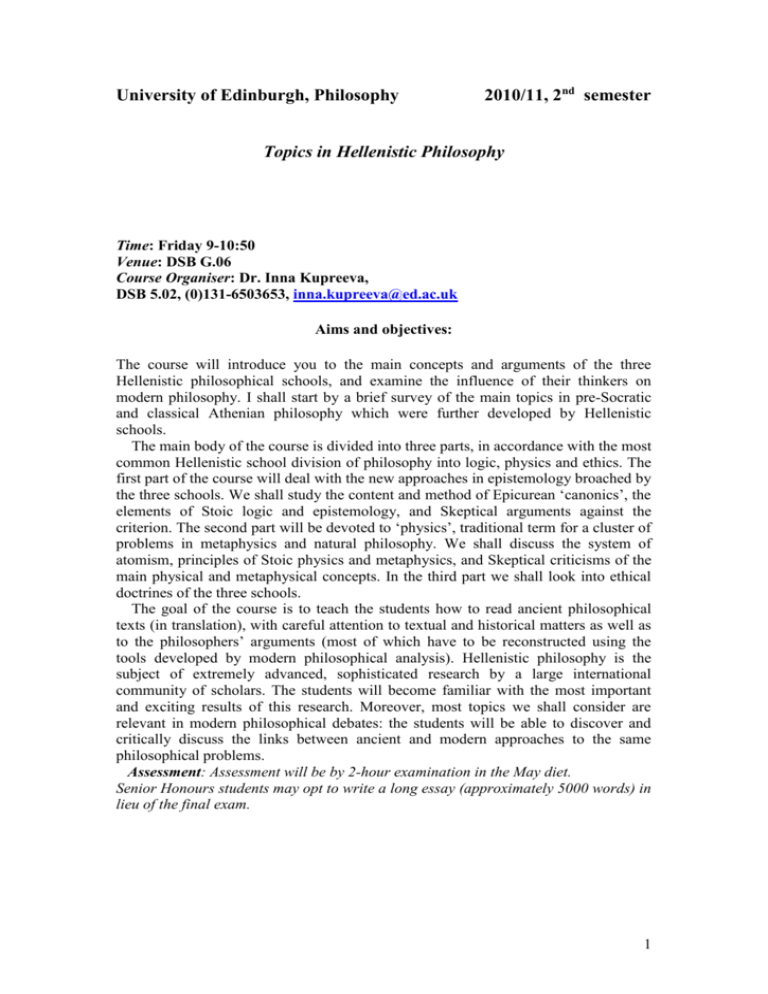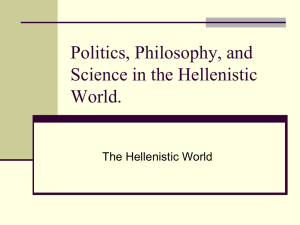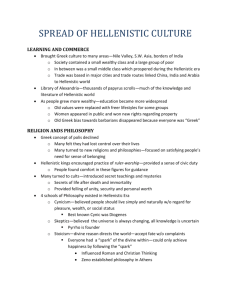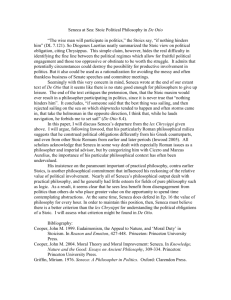Time-table - Philosophy - University of Edinburgh
advertisement

University of Edinburgh, Philosophy 2010/11, 2nd semester Topics in Hellenistic Philosophy Time: Friday 9-10:50 Venue: DSB G.06 Course Organiser: Dr. Inna Kupreeva, DSB 5.02, (0)131-6503653, inna.kupreeva@ed.ac.uk Aims and objectives: The course will introduce you to the main concepts and arguments of the three Hellenistic philosophical schools, and examine the influence of their thinkers on modern philosophy. I shall start by a brief survey of the main topics in pre-Socratic and classical Athenian philosophy which were further developed by Hellenistic schools. The main body of the course is divided into three parts, in accordance with the most common Hellenistic school division of philosophy into logic, physics and ethics. The first part of the course will deal with the new approaches in epistemology broached by the three schools. We shall study the content and method of Epicurean ‘canonics’, the elements of Stoic logic and epistemology, and Skeptical arguments against the criterion. The second part will be devoted to ‘physics’, traditional term for a cluster of problems in metaphysics and natural philosophy. We shall discuss the system of atomism, principles of Stoic physics and metaphysics, and Skeptical criticisms of the main physical and metaphysical concepts. In the third part we shall look into ethical doctrines of the three schools. The goal of the course is to teach the students how to read ancient philosophical texts (in translation), with careful attention to textual and historical matters as well as to the philosophers’ arguments (most of which have to be reconstructed using the tools developed by modern philosophical analysis). Hellenistic philosophy is the subject of extremely advanced, sophisticated research by a large international community of scholars. The students will become familiar with the most important and exciting results of this research. Moreover, most topics we shall consider are relevant in modern philosophical debates: the students will be able to discover and critically discuss the links between ancient and modern approaches to the same philosophical problems. Assessment: Assessment will be by 2-hour examination in the May diet. Senior Honours students may opt to write a long essay (approximately 5000 words) in lieu of the final exam. 1 Selected bibliography Primary sources B.C. Inwood, L.P. Gerson (eds), Hellenistic Philosophy: Introductory Readings [IG], Hackett, 1988 A.A. Long, D.N. Sedley, The Hellenistic Philosophers, vols.1-2, [LS] Cambridge, 1987 M.F. Smith (ed., trans.), Lucretius, On the Nature of Things, Hackett, 2001 J. Annas, R. Woolf (eds), Cicero, On Moral Ends, Cambridge, 2002 C. Gill (ed.), R. Hard (trans), Epictetus, The Discourses, Everyman, 1995 C. Gill (ed.), R. Hard (trans.), Marcus Aurelius, Meditations, Wordsworth, 1997 J. M. Cooper, J.F. Procopé (eds), Seneca Moral and Political Essays, Cambridge, 1995 J. Annas, J. Barnes (ed., trans.) Sextus Empiricus The Outlines of Pyrrhonism, Cambridge, 2000 I. Ramelli, D. Konstan (eds), Hierocles the Stoic: Elements of Ethics, Fragments and Excerpts, Brill, 2009 C. Brittain (ed), Cicero on Academic Scepticism, Hackett, 2005 Ph.and E.A. de Lacy (eds) Philodemus: On methods of inference, Baltimore, 1941 Secondary Literature (general) J. Allen, Inference from signs: ancient debates about the nature of evidence, Oxford, 2001 J. Annas, Hellenistic Philosophy of Mind, Berkeley, 1992 J. Annas, The Morality of Happiness, New York/Oxford, 1993 J. Barnes, M. Mignucci (eds) Matter and Metaphysics, Naples, 1988 J. Barnes, J. Brunschwig, M. Burnyeat, M. Schofield (eds) Science and Speculation: Studies in Hellenistic theory and practice, Cambridge/Paris, 1982 J. Brunschwig, Papers in Hellenistic philosophy, Cambridge, 1994 L. Castagnoli, Ancient Self-Refutation: The Logic and History of the Self-Refutation Argument from Democritus to Augustine, Cambridge. 2010 D. Frede, A. Laks (eds), Traditions of Theology: Studies in Hellenistic Theology, Its Background and Aftermath, Brill, 2001 M. Frede, Essays in Ancient Philosophy, Oxford, 1987 D.J. Furley (ed.) From Aristotle to Augustine (Routledge History of Philosophy, vol.2), London 1997 D.J. Furley, Cosmic Problems: Essays on Greek and Roman Philosophy of Nature, Cambridge, 1989 Ph. van der Eijk, Medicine and Philosophy in Classical Antiquity: Doctors and Philosophers on Nature, Soul, Health and Disease, Cambdrige, 2005 C. Gill, The Structured Self in Hellenistic and Roman Thought, Oxford, 2006 C. Gill, Naturalistic Psychology in Galen and Stoicism, Oxford, 2010 M. Griffin, J. Barnes (eds.) Philosophia Togata I and II, Oxford, 1989 and 1997. B. Inwood, J. Mansfeld (eds) Assent and Argument: Studies in Cicero’s Academic Books, Brill, 1997 R.J. Hankinson, Cause and Explanation in Ancient Greek Thought, Oxford, 1998 P.O. Kristeller, Greek Philosophers of the Hellenistic Age, New York, 1993 2 A.A. Long, Hellenistic Philosophy: Stoics, Epicureans, Sceptics, Berkeley, 1988 A.A. Long, From Epicurus to Epictetus: Studies in Hellenistic and Roman Philosophy, Oxford, 2006 V. Nutton, Ancient Medicine, London, 2004 D.N. Sedley, Creationism and Its Critics in Antiquity, Berkeley, 2007 M. Schofield, M. Burnyeat, J. Barnes (ed), Doubt and Dogmatism, Cambridge, 1980 M. Schofield, G. Striker (eds), The Norms of Nature: Studies in Hellenistic Ethics, Oxford, 1986 R.W. Sharples, Stoics, Epicureans and Skeptics: An Introduction to Hellenistic Philosophy, London, 1996 R. Sorabji, Emotions and Peace of Mind: from Stoic Agitation to Christian Temptation, Oxford, 2002 H. von Staden, Herophilus, Cambridge, 1989 G. Striker, Essays on Hellenistic Epistemology and Ethics, Cambridge, 1988 Secondary Literature on Epicureans E. Asmis, Epicurus’ Scientific Method, Ithaca, N.Y., 1984 D. Clay, Lucretius and Epicurus, Ithaca, 1983 W. Englert, Epicurus on the Swerve and Voluntary Action, Atlanta, Ga., 1987 D. Fowler, Lucretius on atomic motion, Oxford, 2002 D. J. Furley, Two Studies in Greek Atomists, Princeton, 1967 M Gigante, Philodemus in Italy: The Books from Herculaneum, Ann Arbor, 1995 P. Gordon, Epicurus in Lycia: The Second Century World of Diogenes of Oenoanda, Ann Arbor, 2003 D. Konstan, Some aspects of Epicurean psychology, Leiden, 1973, revised edition: A Life Worthy of the Gods: The Materialist Psychology of Epicurus. Las Vegas: Parmenides Publishing, 2009. P. Mitsis, Epicurus’ Ethical Theory: The Pleasures of Invulnerability, Ithaca/London, 1988 T. O’Keefe, Epicurus on Freedom, Cambridge, 2005 J. M. Rist, Epicurus: An Introduction, Cambrdige, 1972 D.N. Sedley, Lucretius and the Transmission of the Greek Wisdom, Cambridge, 1998 V. Tsouna, The Ethics of Philodemus, Oxford, 2007 J. Warren, Epicurus and Democritean ethics: an archaeology of ataraxia, Cambridge, 2002 J. Warren, Facing death: Epicurus and his critics, Cambridge, 2004 J. Warren (ed) The Cambridge Companion to Epicureanism, 2009 Secondary literature on the Stoics: S. Bobzien, Determinism and Freedom in Stoic Philosophy, Oxford, 1998 T. Brennan, The Stoic Life: Emotions, Duties, and Fate, Oxford, 2005 H. Dyson, Prolepsis and Ennoia in the early Stoa, W. de Gruyter, 2009 M. Griffin, Seneca: A Philosopher in Politics, Oxford, 1976 K. Ierodiakonou (ed) Topics in Stoic Philosophy, Oxford, 1999 D.E. Hahm, The Origins of Stoic Cosmology, Columbus, Oh., 1977 B.C. Inwood, Ethics and Human Action in Early Stoicism, Oxford, 1985 B.C. Inwood (ed.) The Cambridge Companion to the Stoics, Cambridge 2003 3 B.C. Inwood, Reading Seneca: Stoic Philosophy at Rome, Oxford, 2005 A. Erskine, The Hellenistic Stoa: Political Thought and Action, Ithaca, 1990 A.A. Long, Problems in Stoicism, London, 1971 (repr. 1996) A.A. Long, Stoic Studies, Cambridge, 1996 G. Reydams-Schils, The Roman Stoics: Self, Responsibility and Affection, Chicago,2005 J.M. Rist, Stoic Philosophy, Cambridge, 1966 (later repr.) J.M. Rist (ed), The Stoics, Berkeley/Los Angeles, London, 1978 R. Salles, The Stoics on Determinism and Compatibilism, Ashgate, 2005 R. Salles (ed) God and Cosmos in Stoicism, Oxford, 2009 S. Sambursky, The Physics of the Stoics, London, 1959 F.H. Sandbach, Aristotle and the Stoics, Cambridge 1985 F.H. Sandbach, The Stoics, 2nd ed., Bristol/London, 1989 M. Schofield, The Stoic Idea of the City, Cambridge, 1991 T. Tieleman, Galen and Chrysippus on the soul: argument and refutation in the De Placitis books II-III, Brill, 1996 T. Tieleman, Chrysippus' On affections: reconstruction and interpretations, Brill, 2003 K.M. Vogt, Law, Reason, and the Cosmic City: Political Philosophy in the early Stoa, Oxford, 2008 G. Watson, The Stoic Theory of Knowledge, Belfast, 1966 Secondary literature on the Skeptics J.E. Annas, J. Barnes, The Modes of Scepticism: Ancient Texts and Modern Interpretations, Cambridge, 1985 J. Barnes, The Toils of Scepticism, Cambridge, 1990 R. Bett, Pyrrho, his antecedents and his legacy, Oxford, 2003 R. Bett (ed) The Cambridge Companion to Scepticism, 2010 Ch. Brittain, Philo of Larissa: The Last of Academic Sceptics, Oxford, 2001 M.F. Burnyeat, (ed.) The Skeptical Tradition, 1983 M.F. Burnyeat and M. Frede (eds), The Original Sceptics: A Controversy, Indianapolis/Cambridge, 1997 R.J. Hankinson, The Sceptics, London and New York, 1995 C. Perin, The Demands of Reason: an Essay on Pyrrhonian Scepticism, Oxford, 2010 R. Polito, The Sceptical Road: Aenesidemus’ Appropriation of Heraclitus, Leiden, 2004 H. Thorsrud, Ancient Scepticism (Ancient Philosophies), Durham and Berkeley, 201 Time-table and readings Seminar 1. Introduction: sources, method, goals of the course. Reading 4 S. Everson, ‘Epicureanism’ in D. Furley (ed), From Aristotle to Augustine, London, 1997, 188-221 M. Frede, ‘The Sceptics’, ibid., 253-286 B. Inwood, ‘Stoicism’, ibid., 222-252 A.A. Long, Hellenistic philosophy: Stoics, Epicureans, Sceptics, Berkeley, 1974, 1-13 A.A. Long, ‘Socrates in Hellenistic philosophy’, in his Stoic Studies, 1986, 1-34 A.A. Long, D.N. Sedley, The Hellenistic philosophers, vol.1, 1987, 1-9 R.W. Sharples, Stoics, Epicureans and Sceptics, ch. 1, London, 1996, 1-10 *J. Mansfeld, ‘Sources’, in K. Algra, J. Barnes, J. Mansfeld, M. Schofield, The Cambridge History of Hellenistic Philosophy [CHHP], Cambridge, 1999, 3 – 30 *T. Dorandi, ‘Chronology’ in CHHP, 31 – 54 *T. Dorandi, ‘Organization and structure of the philosophical schools’, in CHHP, 55 – 64 *M. Gigante, Philodemus in Italy, Ann Arbor, 1995 *D.N. Sedley, ‘The School, from Zeno to Arius Didymus’ in B. Inwood (ed) The Cambridge Companion to Stoicism, 7 – 32 *C. Gill, ‘The School in the Roman Imperial Period’, ibid., 33 - 58 Seminar 2. Epicureans on knowledge and its sources Reading Primary sources: Epicurus, Letter to Herodotus, in: B.C. Inwood, L.P. Gerson, Hellenistic Philosophy. Lucretius, On the Nature of Things, Book 4, lines 54-823 A.A. Long, D.N. Sedley, The Hellenistic philosophers, vol.1, ‘Introduction’, Cambridge, 1987, sections 16-18 *Ph.and E.A. de Lacy (eds) Philodemus: On methods of inference, Baltimore, 1941 Secondary Literature: S. Everson, ‘Epicureanism’ in D. Furley (ed), From Aristotle to Augustine, London, 1997, 188-221 S. Everson, ‘Epicurus on the Truth of the Senses,’ in Stephen Everson (ed.), Epistemology, Cambridge: Cambridge University Press, 1990, 161–183. A.A. Long, Hellenistic philosophy: Stoics, Epicureans, Sceptics, ‘Introduction’, Berkeley, 1974, 14-29 D.N. Sedley, Lucretius and the Transformation of Greek Wisdom, Cambridge, 1998, 94-133 R.W. Sharples, Stoics, Epicureans and Sceptics, ch. 1, London, 1996, 5-8, 11-19 G. Striker, ‘Epicurus on the truth of sense impressions’ in her Essays on Hellenistic Epistemology and Ethics, 77 - 91 *J. Allen, Inference from Signs, 194 - 241 *E. Asmis, Epicurus’ Scientific Method, Ithaca, N.Y., 1984 *C.C.W. Taylor, “‘All Perceptions are True’,” in M. Schofield, J. Barnes and M. Burnyeat (eds.), Doubt and Dogmatism, Oxford: Oxford University Press, 1980, 105– 24. 5 Seminar 3. Stoic epistemology Reading Primary sources: B. Inwood, L. Gerson (eds) Hellenistic Philosophy: Introductory Readings, Indianapolis/Cambridge, 1988 (2nd ed. 1997), 103-131 A.A. Long, D.N. Sedley, The Hellenistic Philosophers, Cambridge, 1987, sec. 39-42 Secondary literature: M. Frede, ‘Stoic epistemology’, in K. Algra, J. Barnes, J. Mansfeld, M. Schofield (eds), Cambridge History of Hellenistic Philosophy, Cambridge, 1999, 295-322 R.J. Hankinson, ‘Stoic Epistemology’ in B. Inwood (ed) The Cambridge Companion to the Stoics, Cambridge, 2003, 59-84 A.A. Long, Hellenistic philosophy: Stoics, Epicureans, Sceptics, ‘Introduction’, Berkeley, 1974, 107-147 R.W. Sharples, Stoics, Epicureans and Sceptics, ch. 1, London, 1996, 20-27 *J. Annas, Hellenistic Philosophy of Mind, 1992, 71 - 88 *H. Dyson, Prolepsis and Ennoia in the early Stoa, Berlin, 2009 Seminar 4. Ancient scepticism Reading Primary sources: Sextus Empiricus, Outlines of Scepticism, ed. by Julia Annas and J. Barnes, Cambridge, 2001, ‘Introduction’, Book 1; Book 2 sections i-xi. A.A. Long, D.N. Sedley, The Hellenistic Philosophers, Cambridge, 1987, sec. 1-3, 39-42, 68-72 (alternatively: B. Inwood, L. Gerson (eds) Hellenistic Philosophy: Introductory Readings, Indianapolis/Cambridge, 1988 (2nd ed. 1997), 261-341) *C. Brittain (ed), Cicero on Academic Scepticism, Hackett, 2005 Secondary literature: M. Frede, ‘The sceptics’, in D. Furley (ed), From Aristotle to Augustine, London, 1997, 253-286 A.A. Long, Hellenistic philosophy: Stoics, Epicureans, Sceptics, Berkeley, 1974, 75106 R.W. Sharples, Stoics, Epicureans and Sceptics, ch. 1, London, 1996, 27-32 H. Thorsrud, Ancient Scepticism, 2009 C. Perin, The Demands of Reason, Oxford, 2010 *M. Burnyeat, M. Frede (eds), The Original Sceptics: A Controversy, Hackett, 1997 *R.J. Hankinson, The Sceptics, London and New York, 1995 6 Seminar 5. Epicurean cosmos and freedom: anti-teleology and indeterminism Reading: Primary sources: Epicurus, Letter to Herodotus; Letter to Pythocles (both in B. Inwood, L. Gerson (eds) Hellenistic Philosophy: Introductory Readings, Indianapolis/Cambridge, 1988 (2nd ed. 1997), 5-28) A.A. Long, D.N. Sedley, The Hellenistic Philosophers, Cambridge, 1987, sec. 4-15 Lucretius, On the Nature of Things, Bks 1 (146-634), 2, 3*, 4 (824-1280) Secondary literature: S. Everson, ‘Epicureanism’ in D. Furley (ed), From Aristotle to Augustine, 1997, 188221 D. Furley, ‘The cosmological crisis in classical antiquitty’ in his Cosmic problems, 223 - 235 A.A. Long, Hellenistic philosophy: Stoics, Epicureans, Sceptics, 1974, 30-56 T. O’Keefe, Epicurus on Freedom, Cambridge, 2005 D. N. Sedley, Creationism and its critics in antiquity, Berkeley, 2007, 133-166 R.W. Sharples, Stoics, Epicureans and Sceptics, London, 1996, 34-43 *E. Asmis, 1990. “Free Action and the Swerve” (Review of Walter G. Englert, Epicurus on the swerve and voluntary action), Oxford Studies in Ancient Philosophy, 8 (1990): 275–291 *D. Furley, Two Studies in the Greek Atomists, Princeton, 1967. *S. Bobzien, “Did Epicurus Discover the Free-Will Problem?” Oxford Studies in Ancient Philosophy, 19 (2000), 287–337. *W.G. Englert, Epicurus on the Swerve and Voluntary Action, Atlanta, 1987 *J.S. Purinton, “Epicurus on ‘Free Volition’ and the Atomic Swerve,” Phronesis, 44 (1999): 253–299. *D. Russell, “Epicurus and Lucretius on Saving Agency,” Phoenix, 54 (2000), 226– 243. * D.N. Sedley, “Epicurus' Refutation of Determinism,” in SUZHTHSIS: Studi sull'epicureismo greco e romano offerti a Marcello Gigante, Naples, 1993, 11–51. Seminar 6. Stoic cosmos and the problem of freedom (teleology and determinism) Reading: Primary sources: B. Inwood, L. Gerson (eds) Hellenistic Philosophy: Introductory Readings, Indianapolis/Cambridge, 1988 (2nd ed. 1997, 132 - 190 A.A. Long, D.N. Sedley, The Hellenistic Philosophers, Cambridge, 1987, sections 4448, 52-55 Secondary literature: T. Brennan, The Stoic Life, Oxford, 2005, 233 - 306 7 D. Frede, ‘Stoic Determinism’ in B. Inwood (ed) The Cambridge Companion to Stoicism, Cambridge, 2003, 179 – 205 M. Frede, ‘The Original Notion of Cause’ A.A. Long, Hellenistic Philosophy: Stoics, Epicureans, Sceptics, Berkeley, 1974 R.W. Sharples, Stoics, Epicureans, and Sceptics, London 1996, 34 – 43 K.M. Vogt, ‘Sons of the Earth: Are the Stoics the Metaphysical Brutes?’ Phronesis 54 (2009), 136 - 154 M. White, ‘Stoic Natural Philosophy (Physics and Cosmology)’ in B. Inwood (ed) The Cambridge Companion to Stoicism, Cambridge, 2003, 124 – 152 *S. Bobzien, Determinism and Freedom in Stoic Philosophy, Oxford, 1998 *R. Salles, The Stoics on Determinism and Compatibilism, Ashgate, 2005 Seminar 7: Ethics: the concept of moral end. Epicureanism. Reading: Primary sources: Epicurus, Letter to Menoeceus Cicero, On Moral Ends, Books 1-2 Secondary sources: S. Everson, ‘Epicureanism’ in D. Furley (ed), From Aristotle to Augustine, London, 1997, 188 - 221 A.A. Long, Hellenistic philosophy: Stoics, Epicureans, Sceptics, Berkeley, 1974, 49 – 74 R.W. Sharples, Stoics, Epicureans and Sceptics, London, 1996, 59 – 66, 84 – 113, 116 – 123 *J. Annas, The Morality of Happiness, Oxford, 1993 *J. Cooper, ‘Pleasure and Desire in Epicurus,’ in J. Cooper, Reason and Emotion, Princeton: Princeton University Press, 1999, 485–514 *J. Purinton, “Epicurus on the Telos,” Phronesis, 38 (1993), 281–320. *G. Striker, ‘Ataraxia: happiness as tranquillity’ in her EHEE, 183 – 195 *G. Striker, ‘Epicurean hedonism’, ibid., 196 - 208 Seminar 8: Stoic ethics: living in accordance with nature Reading: Primary sources A.A. Long, D.N. Sedley, The Hellenistic Philosophers, Cambridge, 1987, 57-64 Cicero On moral ends, books 3-4 Secondary literature: T. Brennan, The Stoic Life, Oxford, 2005, 115 - 168 8 M. Frede, ‘On the Stoic conception of the good’ in K. Ierodiakonou (ed) Topics in Stoic philosophy, Oxford, Clarendon, 1999, 71 – 94 A.A. Long, Hellenistic philosophy: Stoics, Epicureans, Sceptics, Berkeley, 1974, 170 – 209 E.G. Pembroke, ‘Oikeiôsis’ in A.A. Long (ed), 1971, Problems in Stoicism, London, 114 – 49 R.W. Sharples, Stoics, Epicureans and Sceptics, London, 1996, 67 – 78, 100 – 113, 123 – 7 *J. Annas, The Morality of Happiness, Oxford, 1993 *B. Inwood, Ethics and Human Action in Stoicism, Oxford, 1991 *G. Striker, ‘Following nature: a study in Stoic ethics’ in her EHEE 221 – 280 *G. Striker, ‘The role of oikeiôsis in Stoic ethics’, EHEE 281 – 97 Seminar 9: Stoic theory of virtue Reading Primary sources: A.A. Long, D.N. Sedley, The Hellenistic Philosophers, Cambridge, 1987, 59 – 61 B.C. Inwood, L.P. Gerson (eds), Hellenistic Philosophy: Introductory Readings, Hackett, 1988, 190 – 232 Alexander of Aphrodisias, Supplement to On the Soul (trans. R.W. Sharples), London, Duckworth, 2004, chapters 18 and 20. Secondary literature: T. Brennan, The Stoic Life, Oxford, 2005, 169 - 232 T. H. Irwin, The Development of Ethics, vol. 1, 285 – 359 I.G. Kidd, ‘Stoic Intermediates and the End for Man’ in A.A. Long (ed) Problems in Stoicism, 150 – 72 A.A. Long, ‘The harmonics of Stoic virtue’ in his Stoic Studies, Berkeley, 1996 M. Schofield, ‘Stoic Ethics’ in B. Inwood (ed) The Cambridge Companion to Stoicism, Cambridge, 2003, chapter 9 Seminar 10: Hellenistic theories of affections: Stoics and Epicureans Reading Primary sources: A.A. Long, D.N. Sedley, The Hellenistic Philosophers, Cambridge, 1987, section 65 M. Graver (ed), Cicero, Tusculan Disputations, Chicago, 2007, books 3 and 4 Secondary literature: 9 J. Annas, Hellenistic Philosophy of Mind, Berkeley, 1992, chapters 5 and 9 T. Brennan, The Stoic Life, 82 - 114 B.C. Inwood, Ethics and Human Action in Early Stoicism, Oxford, 1985, 127 -181 M.C. Nussbaum, The Therapy of Desire, Princeton, 1993, chapters 4 -7, 9-13 *M. Graver, Stoicism and emotion, Chicago, 2007 *V. Tsouna, The Ethics of Philodemus, Oxford, 2007 Seminar 11: Theory of action and ethics in scepticism. Reading Primary sources: J. Annas, J. Barnes (eds), Sextus Empiricus, Outlines of Scepticism, Cambridge University Press, Book I, sections i – xiv, xviii – xxviii; Book III, xxi - xxxii B.C. Inwood, L.P. Gerson (eds), Hellenistic Philosophy: Introductory Readings, Hackett, 1988, 387 – 397 Secondary literature: J. Annas, ‘Doing without objective values: ancient and modern strategies’ in M. Schofield and G. Striker (eds) The Norms of Nature, Cambridge, 3 – 30 M. Burnyeat, ‘Can the Skeptic Live His Skepticism?’ in M. Burnyeat (ed) The Skeptical Tradition, Berkeley, 1983 and repr. in M.F. Burnyeat and Michael Frede (eds) The Original Sceptics: A Controversy, Indianapolis: Hackett, 1997 M.C. Nussbaum, The Therapy of Desire, Princeton, 1994, chapter 8 R.W. Sharples, Stoics, Epicureans and Sceptics, London, 1996, 78 – 81, 113 – 115 *M.F. Burnyeat and Michael Frede (eds) The Original Sceptics: A Controversy, Indianapolis: Hackett, 1997 10







